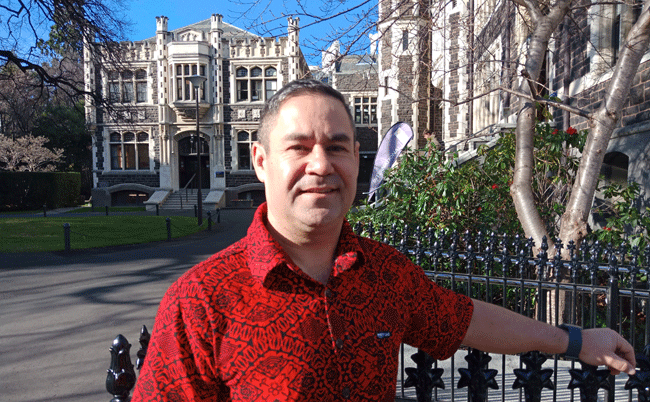
Associate Professor Daryl Schwenke is hoping to undertake biomedical research into why cardiovascular disease is higher in Pasifika communities than other ethnicities.
A new line of research is proposed at Otago to discover whether there are physiological reasons for higher instances of cardiovascular disease in Pasifika peoples.
Physiology's Associate Professor Daryl Schwenke spoke at the International Initiatives seminar last week on Cardiovascular Disease in Pasifika – breaking down the disparities between ethnicities.
The average person has a 30 per cent chance of encountering or dying from a cardiovascular event, but for those of Pacific Island heritage the “odds are well stacked against you”, Associate Professor Schwenke says.
“Pacific people are disproportionately overrepresented in those with cardiovascular disease.
“It is emerging that a contributing factor to this is the fact that Pasifika people have a much higher prevalence of developing diabetes than the rest of the New Zealand population, and of course diabetes – which is the foundation for a whole host of diseases – also increases your chances of developing cardiovascular disease.”
"More importantly, if we can begin to understand why they are more predisposed to this then can we develop particular therapeutic strategies to target our Pacific people?"
Research shows that not only are Pasifika people more predisposed to cardiovascular disease, but when they get it the severity of the disease is more pronounced.
Dr Schwenke says this is just the start of a journey in understanding the difference in cardiovascular disparities in ethnicities.
He wants to drive a line of research to find out why this particular ethnic group is more predisposed.
“What is it specifically within their biology that predisposes them to cardiovascular disease? More importantly, if we can begin to understand why they are more predisposed to this then can we develop particular therapeutic strategies to target our Pacific people?”
Associate Professor Schwenke's research will involve biomedical studies into the function of how the heart and blood vessels work in different ethnicities.
His research aims to look beyond diet, genetics and socioeconomic status to see whether there is a difference in how the heart and blood vessels work in a coordinated fashion between different ethnicities.
However, there are cultural issues which need to be considered when it comes to doing biomedical studies, particularly with regards to Pacific communities. Dr Schwenke says previous research suggests Pacific involvement in biomedical research is lower than other ethnicities.
“This poses a slight dilemma because in order to do biomedical research you actually need the physical tissue or blood sample from those willing to donate tissue.
“We need to have access to human tissue in order to identify the functional and cellular differences in how these tissues work.”
Associate Professor Schwenke says a lack of culturally appropriate protocol could be one reason why Pasifika are less likely to consent with tissue donation for the purpose of biomedical research. He says one of the first steps in breaking down the disparities is first understanding how to respectfully engage with Pacific people to encourage them to be involved in biomedical studies, and to emphasise the need for their help in furthering medical understanding of how the cardiovascular system works.
"This poses a slight dilemma because in order to do biomedical research you actually need the physical tissue or blood sample from those willing to donate tissue."
A study led by Dr Rose Richards Hessell, Associate Dean Pacific for the Dunedin School of Medicine, and Faumuina Associate Professor Faafetai Sopoaga, the Division of Health Sciences' Associate Dean (Pacific), engaged with various groups of the Pacific community to gain an understanding of what it means to donate their own tissue to biomedical studies. Four focus groups with a diversity of age, gender and Pacific backgrounds were engaged.
When the responses were collated, seven themes emerged: diversity, informed consent, communal relationships, spirituality, motivation and meaning, trust and respect and adaptability.
The study found what type of tissue used was contentious – in particular asking for a donation of hair was considered offensive by some Pacific groups, while blood donation was less of an issue, Associate Professor Schwenke says.
“They definitely appreciate being given all the fine details of what the study entails.”
The study also found donation for biomedical research was not just something the individual had to decide for themselves, but was very much a “collective agreement” between family and community, he says.
In order to do future biomedical research, Associate Professor Schwenke says there needs to be a lot of engagement with the Pacific community about why it is important, but researchers must also understand the cultural barriers which may make some hesitant about donating tissue.
“For Pacific peoples to derive the most benefit from research initiatives it is important that as far as possible processes to collect human tissue are aligned with cultural expectations, to support participation and promote engagement because without pacific communities the research isn't going to progress.”